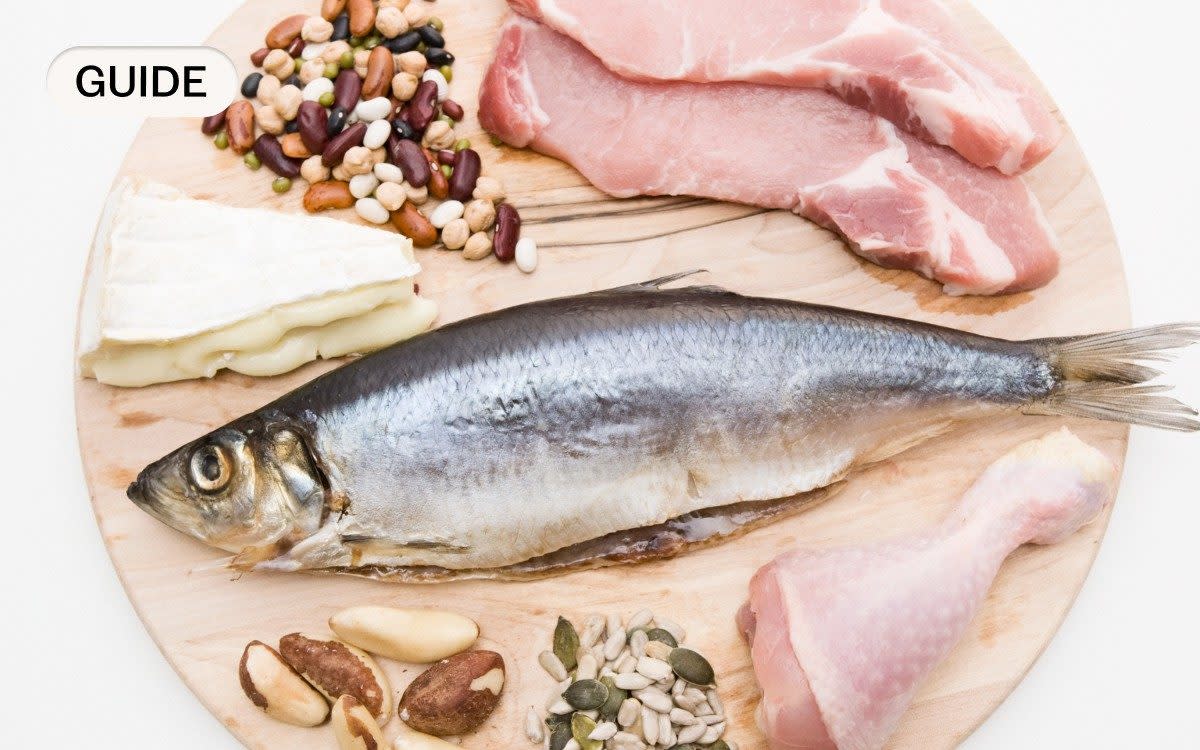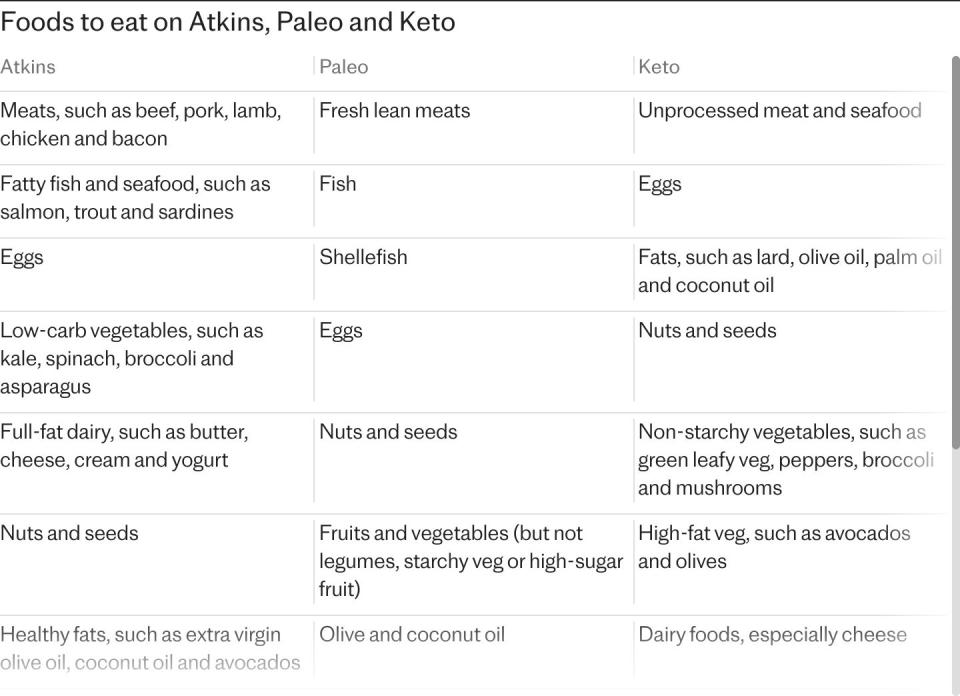Dukan diet explained: Health impact and expert assessment

The Dukan diet has been billed as a fast and effective way to lose weight, yet it remains one of the most controversial.
The low-carb, high-protein diet promotes rapid, permanent weight loss without feeling hungry, yet experts argue it is hugely restrictive, unhealthy, and, ultimately, unsustainable.
“The Dukan goes against all the information we have on following plant-based diets, which we know are good for our health,” says Juliette Kellow, a registered dietitian. “It’s also not budget friendly, or vegetarian/vegan-friendly.”
While fans of the diet may lose weight, very low-carb regimens have been linked to an increased risk of cardiovascular diseases and other hidden health costs. Here’s everything you need to know about this controversial diet.
Jump to:
What is the Dukan diet?
It is a high-protein, low-carb diet created in the 1970s by Pierre Dukan, a former French physician specialising in weight management. Dukan was reportedly inspired by an obese patient who was prepared to give up any food in order to try and slim down, except for meat. The patient lost 5.5 kilograms after his first five days on the diet.
After seeing many patients on his diet experience impressive weight loss, Dukan published his book, The Dukan Diet, in 2000. The book was eventually released in 32 countries and translated into 14 languages.
How does the Dukan diet work?
“The diet is based on the theory that eating a lot of protein can help people lose weight,” explains Dr Abhinav Vepa, a GP specialising in stress management and nutrition. “It’s divided into four phases, each of which sets specific guidelines about what you can eat.”
Only around 100 foods are allowed in total, 68 of which are “pure proteins”, or foods high in protein and low in carbs and fat, such as poultry, fish and lean meat. Most foods high in carbohydrates or fat are excluded during the initial phase.
For each phase, you can choose from the approved lists. The diet limits foods such as grains, beans, and fruit.
According to the plan, people can lose up to 8lbs during the first phase, followed by about 2lbs per week until reaching their ideal weight, which you can stick to long-term, without restricted eating.
Phases of the Dukan diet
Consult a registered dietitian or GP before starting any weight-loss plan.
The Dukan has two weight-loss phases and two maintenance phases. It demands a lot of effort and is extremely restrictive, especially in the earlier phases. You also must eat a specified amount of oat bran each day. There is no calorie counting and, depending what phase you’re in, you’re able to eat as much as you please of 100 foods (68 pure proteins and 32 non-starchy vegetables).
Phase 1: Attack
The shortest and most restrictive, lasting between two to seven days.
Choose only from a list of 68 high-protein foods, such as chicken, seitan, reduced-fat bacon, and fat-free dairy products (restricted to 32oz or 1kg per day). Fatty meats and full-fat dairy products are not allowed.
One and half tablespoons of oat bran (mandatory)
At least 1.5 litres of water per day (mandatory)
20 minutes of physical activity daily
Phase 2: Cruise
Lasts until your “true weight” is achieved. This is a healthy weight you’re able to maintain based on age, sex, height and weight loss history.
In addition to the 68 high-protein foods permitted in the first phase, you can add 32 vegetables, including limited quantities of olive oil
This phase alternates between two days. On day one, you’re restricted to Attack phase foods, them on day two, attack phase foods plus vegetables
One serving of carrots or beetroot daily
Two tablespoons of oat bran daily
Exercise for 30 minutes daily
Phase 3: Consolidation
Now you’re preventing weight gain by gradually introducing ‘forbidden’ foods, such as fruits and starchy vegetables, and allowing two ‘celebration meals’ per week. You follow this phase for five days for each pound lost during the Cruise phase.
You can mix and match any of the foods from Attack and Cruise phases, along with:
Fruit: One serving of fruit per day, such 100g of berries or chopped melon; one medium apple, orange, pear, peach, or nectarine; or two kiwis, plums, or apricots
Bread: Two slices of wholegrain bread daily with a small amount of reduced fat butter or spread
Cheese: One serving (1.5 ounces or 40 grams) dail
Starches: 1–2 servings of starches per week, such as 8oz (225 grams) of pasta and other grains, corn, beans, legumes, rice, or potatoes
Meat: Roast lamb, pork or ham 1–2 times per week
Celebration meals: A starter, main course, dessert and a glass of wine
Two and half tablespoons of oat bran daily
Exercise 25 minutes per day
Eat only lean proteins one day per week
Phase 4: Stabilisation
Once you’ve reached your weight goal, this phase is meant to be followed indefinitely. There are no restrictions on food but to maintain your desired weight, Dukan advises the following rules:
Eat only pure protein foods one day a week
Exercise/walk for 20 minutes daily
Take three tablespoons of oat bran daily
Never take a lift or escalators when you can take the stairs
Potential health risks and criticisms
“Nutritionally this is a terrible diet, which goes against healthy eating guidelines.” says Kellow. Five servings of fruits and vegetables a day are recommended. “Very good evidence suggests these foods reduce the risk of a variety of longevity diseases, such as heart disease, some cancers and stroke.”
Kellow also points out that you’re likely to experience classic symptoms associated with very low-carb intakes, especially at the start. Side effects will range from:
Tiredness
Dizziness
Insomnia
Extreme hunger
Nausea
Poor concentration
Bad breath
Feeling weak
Constipation
“Following the Dukan severely limits fibre in your diet – and adding a little oat bran doesn’t come close to ensuring we get enough,” Kellow continues.
“For good health, we should be having 30g of fibre daily. A tablespoon of oat bran contains less than 3g fibre. We know fibre can help to protect against a variety of cancers, such as bowel cancer. But also, higher intakes of fibre and whole grains are linked to better heart health.”
Dr Vepa agrees, highlighting standout health risks from recent studies. “Any diet that eliminates and/or restricts vegetable intake is very bad, because it reduces the consumption of polyphenol antioxidants, which we know are associated with a lower risk of pretty much all diseases, particularly cardiovascular disease.”
Findings from a 2015 study of 51 women on the Dukan Diet found multiple nutritional abnormalities, revealing that following the diet long term may increase the risk of osteoporosis and heart, kidney and liver disease.
Dr Vepa also warns the diet may cause:
IBS symptoms and disruption to the gut microbiome
An increased risk developing kidney stones
An increased risk of cardiovascular disease
Increased bowel cancer risk
Expert assessment
Dukan may promote disordered eating
With any diet that restricts foods, it’s important to consider your overall health, dietary needs and relationship with food. “This diet has the potential for setting up patterns of disordered eating as it eliminates food groups and severely restricts food intake,” Kellow says. “You’re likely to be hungry a lot of the time. When you’re hungry, all you think about is food, resulting in cravings that may result in overeating and less healthy meal choices, and this can set up a binge-starve cycle.”
Nutrient deficient and not backed by science
“The Dukan is archaic, and the science has really moved on since the 1970s,” Dr Vepa says. “For a weight loss diet that helps to look after your heart, reduces risk of disease and improves general wellbeing, I recommend following a balanced diet that is rich in whole foods. Aim for a colourful range of fresh fruits and vegetables, and cut out ultra-processed foods and refined sugar.
“The only good thing about Dukan is the concept of limiting carbs,” says Dr Vepa. “However, a healthy diet is not so much about having more protein, it’s about eating fewer sugary carbs and staying satiated and full.”
One important issue sabotaging any healthy diet, Kellow explains, is that in the UK we have the balance of carbs wrong; we are not eating enough starchy, high fibre ones, such as potato skins, sweet potatoes, figs, wholewheat pasta, and eating far too many sugary ones, such as white bread, white rice and pasta, cake and many breakfast cereals.
Unsustainable and weight likely to be regained
“The biggest con with this diet is that, although there will be weight loss in the short term, it is likely to be regained,” says Dr Vepa. “It’s not a sustainable diet. I advise patients that, after establishing how many calories they should be consuming daily, they need to establish where these calories are coming from: protein, carbs and fat.”
Government advice is 50 per cent of calories from carbs, ideally high fibre ones, and no more than 35 per cent of calories from fat and the remainder from protein.
Comparison with other diets
The Dukan diet is not identical to other lower carb diets, such as Atkins and keto. One of the key differences is that The Dukan diet is low-fat, while the keto diet is a high-fat and moderate protein diet, and Atkins is also a predominantly fat and protein-based diet.

Early phases of the Dukan diet may promote ketosis (where your body burns fat instead of carbs) and are low in fibre (despite the daily serving of oat bran). But, the later phases of Dukan allow for higher quantities of carbs than the keto diet. Therefore, dieters following the Dukan plan are less likely to maintain ketosis.
Dr Vepa says that other diet plans which increase the percentage of carbs could be a better long-term option, easier to maintain and will still have some impact on metabolism.
“There’s evidence a moderate carbohydrate restriction – in the region of 50-130g carbs a day – can support weight loss,” explains Kellow. “But most health professionals don’t advocate extreme carbohydrate restrictions, typically below 50g carbs a day, especially if coupled with very high fat or protein intakes.”
Healthy alternatives to the Dukan diet
“The diet I always recommend for sustainable weight loss is the Mediterranean diet, which is also proven to reduce cardiovascular risk,” says Dr Vepa.
It is the only diet with scientific evidence to promote better overall health and sustainable weight loss (if supported by regular daily activity), he says, with its focus on whole, minimally processed foods such as fruits, vegetables, whole grains, legumes, nuts, seeds, fish, and olive oil. This diet has also been shown to have a positive effect on the gut microbiome, explains Kellow, which helps to regulate the body.
“Diets limiting whole grains, carbohydrates, fruit and vegetables must be playing havoc with our microbiome. It’s fibre that good bacteria feed on.”

 Yahoo News
Yahoo News 
